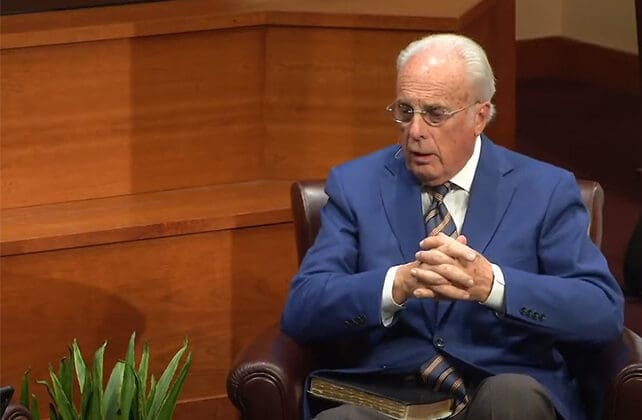
John MacArthur, author and longtime pastor of Grace Community Church (GCC) in Sun Valley, California, was asked this week to weigh in on pastors who plagiarize sermons.
Pastoral plagiarism has been a growing concern among many church leaders, as the Southern Baptist Convention’s president Ed Litton was recently accused of plagiarizing multiple sermons. These accusations resulted in Litton deleting over 100 sermons that had previously been posted online.
In a clip posted by Grace to You’s executive director, Phil Johnson, MacArthur was asked during The Master’s Seminary Day 2021 why it is that pastors plagiarize.
“The intersection of pastoral integrity and the confidence in the Bible leads to expository preaching,” Austin T. Duncan said. “But what we’re seeing now, in a failure in pastoral integrity and a misfire in preaching, is the issue of plagiarism — that high level pastors are being accused of using someone else’s sermons.”
RELATED: Ed Litton Plagiarism? New SBC President’s Church Deletes Over 100 Sermons After Accusations
Duncan then asked the 82-year-old MacArthur where he gets his sermons from. MacArthur replied jokingly, “That’s why you want to come to the Master’s Seminary, because we will teach you how to get your own sermons.”
Duncan asked, “Why does a pastor plagiarize — why does he use someone else’s sermon — why does that happen?” MacArthur didn’t mince words, saying it’s because “he’s lazy and incompetent — and unsanctified.”
Expanding on his answer, MacArthur said, “I think you become a showman at that point —you’re an actor. You’re playing a part. You’re playing a role.”
MacArthur then stressed the importance of pastors studying the text for themselves. “The thing that expository preaching does that is apart from the congregation is it sanctifies the pastor. The relentless study of the word of God is how God sanctifies and protects the pastor. When you’re just opening your iPad and reading somebody else’s sermon, you’ve never been exposed to the sanctifying work of the Word.”
“Every time I study the Bible, I see the genius of the divine mind. How everything perfectly connects — that is an exhilarating, worshiping experience. I’ve worshiped long hours ever before I get to Sunday morning.” – John MacArthur
“When a pastor steals or over-borrows someone else’s work, that pastor is not only playing a role like an actor but isn’t a true messenger from the Lord,” MacArthur said.
“For many men in ministry, there’s an unwillingness to be disciplined at that point, because being an expositor is work. And it’s relentless work, because you’ve got to keep doing it week, after week, after week, after week, after week — but it’s the most rewarding thing.”
MacArthur went on to define pastoral plagiarism as “ministerial fraud.”
RELATED: Ed Litton: ‘I Had Permission, Which I Think Means It’s Not Plagiarism’
MacArthur then told the seminary students in attendance, “That’s not to say you can’t preach the same doctrine. There’s only one accurate interpretation of the text. It’s when a pastor’s sentences are ‘exactly verbatim’ of another pastor that they’ve bypassed the spiritual impact of God’s word, and what the divine work the Lord would be doing in their heart, because the truth wasn’t studied like it should have been.”
Speaking about those who use other preachers’ sermons as their own, MacArthur said, “You’re a fraud. You’re an echo, not a voice…There is so much underneath what we say, I can’t imagine just reading the words of a sermon on the surface and not having eight or ten hours underneath that.”
MacArthur estimated that roughly 80 percent of what he preaches in a sermon doesn’t come from any notes he has at the pulpit. “There’s a Spirit-led search in the mind of a pastor when they preach their sermon — for those who spend time studying and preparing. This is completely different than reading some script,” MacArthur said.
“Because you’re an expositor of the Scripture doesn’t mean you preach in a vacuum. You still have to connect with the world around you,” MacArthur continued.
“You may be dealing with the same passage [that you’ve preached before] but the circumstances [and] people you’re speaking to may alter, so the emphasis of the passage shifts in a different direction. Being relevant might demand that even though you go back to a passage, that doesn’t mean your interpretation changes, but your implications and applications probably will, based on the people you’re preaching to and society’s change.”
Watch MacArthur’s full interview posted by The Master’s Seminary on their YouTube channel here.
